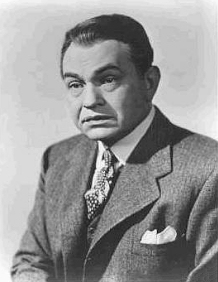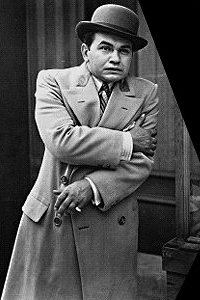 An actor of great range and sensibility who, from the outset of his film career, was typecast as a gangster. One might say that just as John Wayne was the quintessential western hero, Edward G. Robinson was the ultimate movie gangster. With his short stature, bulldog face, and idiosyncratic speech, Robinson was an unlikely box-office draw, but he displayed a combination of vulnerability and unpredictability that mesmerized movie audiences. He appeared in films in a 50-year span, having his greatest impact and popularity during the 1930s and 1940s. Despite his many dynamic performances, Robinson was never nominated for an Oscar.
An actor of great range and sensibility who, from the outset of his film career, was typecast as a gangster. One might say that just as John Wayne was the quintessential western hero, Edward G. Robinson was the ultimate movie gangster. With his short stature, bulldog face, and idiosyncratic speech, Robinson was an unlikely box-office draw, but he displayed a combination of vulnerability and unpredictability that mesmerized movie audiences. He appeared in films in a 50-year span, having his greatest impact and popularity during the 1930s and 1940s. Despite his many dynamic performances, Robinson was never nominated for an Oscar.
Born Emanual Goldenberg in Bucharest, Rumania, he was brought to the United States by his family at age nine, growing up on New York's Lower East Side. After winning a scholarship to the American Academy of Dramatic Arts, he changed his name to Edward G. Robinson. He began his professional acting career in 1913 in stock, making his way to Broadway just two years later. Robinson's first gangster role wasn't in a film but in the Broadway play The Racket (1927). Not long after starring in The Kibitzer, a play he wrote with Jo Swerling, Robinson made his talkie debut as an underworld figure in Paramount's The Hole in the Wall (1929).
He continued playing gangsters in Night Ride (1930), Outside the Law (1930), and The Widow from Chicago (1930). But it wasn't until he starred as Rico Bandello in the Warner Bros. production of Little Caesar (Mervyn LeRoy, 1930) that the critics and the public took notice in a big way. The film was a sensation because of its violence and because of Robinson's brilliant portrayal of the tragic hero. Though there had been gangster films before--and Robinson had starred in many of them--it was Little Caesar's resounding box-office success that established the genre as a Warner Bros. mainstay. It also made Robinson a major star.
 The actor played a wide range of mostly villainous characters throughout the first half of the 1930s. His most interesting films of that period include Two Seconds (1932), Tiger Shark (1932), and Little Giant (1933). But in 1935, he shone even brighter in John Ford's comedy The Whole Town's Talking, playing the dual role of a gangster/timid bank clerk. The tough-guy roles continued during the second half of the 1930s, but Robinson played them with softer edges in movies such as Kid Galahad (1937). Even more significantly, Robinson displayed a gift for comedy in a series of films that cleverly spoofed the gangster genre. His dry (and droll) performances in A Slight Case of Murder (1938), The Amazing Dr. Clitterhouse (1938), and Brother Orchid (1940) continue to hold up very well today.
The actor played a wide range of mostly villainous characters throughout the first half of the 1930s. His most interesting films of that period include Two Seconds (1932), Tiger Shark (1932), and Little Giant (1933). But in 1935, he shone even brighter in John Ford's comedy The Whole Town's Talking, playing the dual role of a gangster/timid bank clerk. The tough-guy roles continued during the second half of the 1930s, but Robinson played them with softer edges in movies such as Kid Galahad (1937). Even more significantly, Robinson displayed a gift for comedy in a series of films that cleverly spoofed the gangster genre. His dry (and droll) performances in A Slight Case of Murder (1938), The Amazing Dr. Clitterhouse (1938), and Brother Orchid (1940) continue to hold up very well today.
Many of Robinson's best films during the 1940s were psychological dramas, such as Manpower (1941), The Woman in the Window (1944), Scarlet Street (1945), and The Red House (1947). But when a villian was needed, there was hardly anyone as convincing as Robinson when he played the mad captain Wolf Larsen in The Sea Wolf (1941) or Rocco, the evil gangster, in Key Largo (1948). But he was equally convincing as the insurance sleuth in Double Indemnity (1944), the Nazi pursuer in The Stranger (1946), and the all-too-human father in All My Sons (1948).
Robinson fell on hard times in the early 1950s when he was called before the House Un-American Activities Committee for his supposed communist leanings. He was cleared, but the very fact that he had to testify hurt his career. For the most part, his films during the 1950s were minor efforts except for supporting parts in Cecil B. DeMille's The Ten Commandments (1956) and Frank Capra's A Hole in the Head (1959). For the rest of his career, Robinson was cast mostly in small featured roles. Nonetheless, he tended to steal films (like the good gangster he was) from such costars as Paul Newman in The Prize (1963) and Steve McQueen in The Cincinnati Kid (1965).
Toward the end of his life, Robinson played aging gangsters in foreign films, but he returned to the United States to support Charlton Heston in the fine science-fiction film Soylent Green (1973). Shortly after his death from cancer at the age of 80, the Academy of Motion Picture Arts and Sciences awarded Robinson a richly deserved Oscar "for his contribution to the acting art."
--SCOTT & BARBARA SIEGEL, from
The Encyclopedia of Hollywood